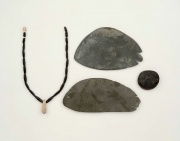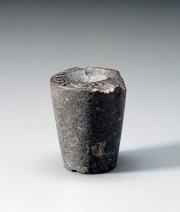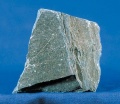Difference between revisions of "Slate"
(username removed) |
|||
| (7 intermediate revisions by 3 users not shown) | |||
| Line 1: | Line 1: | ||
| − | [[File: | + | [[File: Paintingonslate1989814.jpg|thumb|Painting by Brusasorci on slate, MFA# 1989.814]] |
== Description == | == Description == | ||
| − | A fine-grain, homogeneous stone that splits easily into thin, smooth layers. Slate is metamorphosed from [ | + | A fine-grain, homogeneous stone that splits easily into thin, smooth layers. Slate is metamorphosed from [[shale]] with such pressure that the minerals recrystallized at right angles to the pressure. Slate is usually bluish-black or gray-black in color but it also has red, green, and purple variations. High-quality slate, called Welsh slate, has been quarried in Wales since the early 17th century. Quarries in the United States are located in Pennsylvania, Vermont, and Virginia. Slate has been used in construction for roofing and flooring as well as for writing slates and blackboards. In the 16th and 17th century Europe, slate was occasionally used as a support for oil paintings. It is currently used for countertops, fireplace facing, outdoor siding, and as a paving stone. |
| − | [[File:24.734-CR6543-d1.jpg|thumb|]] | + | [[File:11.263-E2068CR-d1.jpg|thumb|Rubbing stone<br>MFA# 11.263]] |
| + | [[File:24.734-CR6543-d1.jpg|thumb|Mouth cup<br>MFA# 24.734]] | ||
== Synonyms and Related Terms == | == Synonyms and Related Terms == | ||
| − | Schiefer (Deut.); pizarra (Esp.); ardoise (Fr.); leisteen (Ned.); | + | Schiefer (Deut.); pizarra (Esp.); ardoise (Fr.); leisteen (Ned.); ardósia (Port.); skiffer (Sven.) |
| + | == Risks == | ||
| − | + | Chronic inhalation of dust may cause silicosis. Nontoxic by ingestion or skin contact. | |
| − | + | == Physical and Chemical Properties == | |
| − | |||
| − | |||
| − | |||
| − | |||
| − | == | ||
| − | + | * Density = 2.6-3.3 g/ml | |
== Additional Images == | == Additional Images == | ||
| Line 27: | Line 24: | ||
</gallery> | </gallery> | ||
| + | ==Resources and Citations== | ||
| − | + | * G.S.Brady, ''Materials Handbook'', McGraw-Hill Book Co., New York, 1971 Comment: p. 729 | |
| − | |||
| − | * | ||
* ''Dictionary of Building Preservation'', Ward Bucher, ed., John Wiley & Sons, Inc., New York City, 1996 | * ''Dictionary of Building Preservation'', Ward Bucher, ed., John Wiley & Sons, Inc., New York City, 1996 | ||
| − | * | + | * Thomas C. Jester (ed.), ''Twentieth-Century Building Materials'', McGraw-Hill Companies, Washington DC, 1995 |
* ''Van Nostrand's Scientific Encyclopedia'', Douglas M. Considine (ed.), Van Nostrand Reinhold, New York, 1976 | * ''Van Nostrand's Scientific Encyclopedia'', Douglas M. Considine (ed.), Van Nostrand Reinhold, New York, 1976 | ||
| − | * | + | * R.F.Symmes, T.T.Harding, Paul Taylor, ''Rocks, Fossils and Gems'', DK Publishing, Inc., New York City, 1997 |
* ''The American Heritage Dictionary'' or ''Encarta'', via Microsoft Bookshelf 98, Microsoft Corp., 1998 | * ''The American Heritage Dictionary'' or ''Encarta'', via Microsoft Bookshelf 98, Microsoft Corp., 1998 | ||
| − | * | + | * Website address 1 Comment: http://www.marble-institute.com |
* ''CRC Handbook of Chemistry and Physics'', Robert Weast (ed.), CRC Press, Boca Raton, Florida, v. 61, 1980 Comment: density=2.6-3.3 | * ''CRC Handbook of Chemistry and Physics'', Robert Weast (ed.), CRC Press, Boca Raton, Florida, v. 61, 1980 Comment: density=2.6-3.3 | ||
| − | * | + | * Michael McCann, ''Artist Beware'', Watson-Guptill Publications, New York City, 1979 |
[[Category:Materials database]] | [[Category:Materials database]] | ||
Latest revision as of 08:48, 24 October 2022
Description
A fine-grain, homogeneous stone that splits easily into thin, smooth layers. Slate is metamorphosed from Shale with such pressure that the minerals recrystallized at right angles to the pressure. Slate is usually bluish-black or gray-black in color but it also has red, green, and purple variations. High-quality slate, called Welsh slate, has been quarried in Wales since the early 17th century. Quarries in the United States are located in Pennsylvania, Vermont, and Virginia. Slate has been used in construction for roofing and flooring as well as for writing slates and blackboards. In the 16th and 17th century Europe, slate was occasionally used as a support for oil paintings. It is currently used for countertops, fireplace facing, outdoor siding, and as a paving stone.
Synonyms and Related Terms
Schiefer (Deut.); pizarra (Esp.); ardoise (Fr.); leisteen (Ned.); ardósia (Port.); skiffer (Sven.)
Risks
Chronic inhalation of dust may cause silicosis. Nontoxic by ingestion or skin contact.
Physical and Chemical Properties
- Density = 2.6-3.3 g/ml
Additional Images
Resources and Citations
- G.S.Brady, Materials Handbook, McGraw-Hill Book Co., New York, 1971 Comment: p. 729
- Dictionary of Building Preservation, Ward Bucher, ed., John Wiley & Sons, Inc., New York City, 1996
- Thomas C. Jester (ed.), Twentieth-Century Building Materials, McGraw-Hill Companies, Washington DC, 1995
- Van Nostrand's Scientific Encyclopedia, Douglas M. Considine (ed.), Van Nostrand Reinhold, New York, 1976
- R.F.Symmes, T.T.Harding, Paul Taylor, Rocks, Fossils and Gems, DK Publishing, Inc., New York City, 1997
- The American Heritage Dictionary or Encarta, via Microsoft Bookshelf 98, Microsoft Corp., 1998
- Website address 1 Comment: http://www.marble-institute.com
- CRC Handbook of Chemistry and Physics, Robert Weast (ed.), CRC Press, Boca Raton, Florida, v. 61, 1980 Comment: density=2.6-3.3
- Michael McCann, Artist Beware, Watson-Guptill Publications, New York City, 1979





